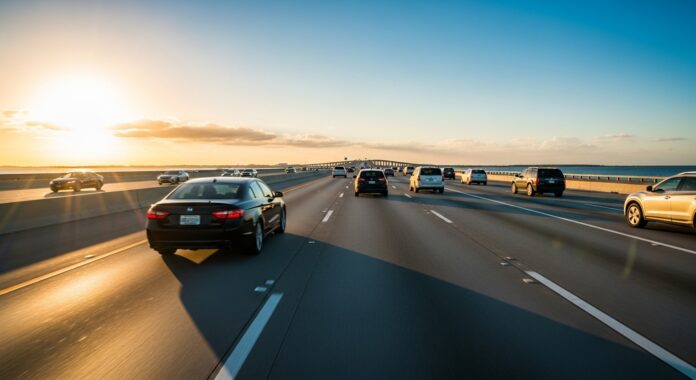Everything drivers should know about Florida’s left-lane rules, from statutes to enforcement and upcoming changes.
Florida’s highways and multilane roads often come with a traffic mantra: “Keep right, pass left.” But how strictly is that enforced? What counts as lingering in the left lane? And what changes might be on the horizon with new legislation?
This guide walks through the current law, exceptions, enforcement, and practical tips for drivers in Florida.
Current Florida Statute: § 316.081 Driving on Right Side; Exceptions
Florida law clearly addresses left-lane use under **Florida Statute 316.081**.
It states:
- Drivers must drive on the **right half** of the roadway when the road is wide enough, except in defined situations (e.g. passing).
- If proceeding slower than the prevailing traffic, a vehicle must stay in the right-hand lane or as close as practicable to the right, unless overtaking, preparing for a left turn, or similar.
- On roads with two or more lanes in the same direction: a driver **may not continue in the farthest left lane** if overtaken from behind by a faster vehicle (unless that driver is actively passing or preparing to turn left).
- Violation of § 316.081 is a noncriminal traffic infraction (i.e. moving violation).
In short: lingering in the left lane while someone else approaches faster is against the law (unless you’re passing or about to turn left).
Other Relevant Statutes & Lane Rules
Lane Discipline: § 316.089 (Driving on Roadways Laned for Traffic)
Also relevant is § 316.089, which mandates that vehicles stay “as nearly as practicable entirely within a single lane” and prohibits changing lanes unsafely. It clarifies that lanes can be designated for particular traffic flows or restricted by signage—and drivers must obey those designations.
Passing on the Right: § 316.084
Law allows passing on the right—but under **strict conditions**
- If the vehicle ahead is turning left or signaling a left turn.
- If there are multiple lanes in your direction and no obstruction (like parked cars) on your side.
- Not on the shoulder or off-road portions.
If you violate § 316.084, it is also a noncriminal moving violation.
Truck & Commercial Vehicle Lane Restrictions
In addition to general rules, **Florida imposes stricter lane restrictions for trucks** (commercial vehicles) under § 316.074. In many rural interstate stretches or designated road segments, trucks are prohibited from using the leftmost or inside lanes. Violating these restrictions triggers a moving violation and, for commercial drivers, can carry more significant consequences (e.g. CDL points, fines).
Proposed Legislation & Shifts: HB 317 / SB 258
Although the law exists today, lawmakers say enforcement is often unclear or difficult. To address that, bills such as HB 317 (Interstate Safety) and SB 258 aim to strengthen left-lane rules — especially in higher-speed corridors.
Under the proposals:
- Drivers would be outright prohibited from cruising in the left lane of roads with speed limits ≥ 65 mph unless actively passing or preparing to exit.
- Fines for “left lane camping” would range from $60 to $150 (or more) depending on location.
- The new rule is set to take effect January 1, 2025 (if signed) — making left-lane enforcement clearer.
Keep an eye on whether these changes are enacted — they may give law enforcement clearer grounds to ticket slow drivers in the left lane.
How Enforcement Works & Penalties
Currently, enforcement of left-lane violations is at the discretion of law enforcement. If an officer determines you’re impeding traffic by staying left while faster drivers are behind, you may receive a noncriminal traffic ticket.
Penalties typically include fines and points on your driving record — the same scale as many other moving violations.
Under new legislation, penalties may be more consistently enforced in high-speed areas.
Practical Tips for Florida Drivers
Knowing the law is one thing; applying it safely is another. Here are actionable tips:
- Move right as soon as safe — once you’re done overtaking, return to the right lanes promptly.
- Use your turn signal to signal lane changes — this is required before leaving your lane.
- Don’t “camp” in the left lane — if you sense someone faster approaching behind, don’t wait until an officer stops you; yield when safe.
- Watch for signage — some highways may post “Left Lane for Passing Only” or similar signs that reinforce restrictions.
- Be aware of trucks — trucks may be barred from the left lane; avoid assuming they’ll move left.
- Don’t pass on the right unless conditions permit — even though Florida allows passing on the right in narrow situations, it’s riskier.
- Stay calm under pressure — avoid weaving between lanes aggressively; patience helps reduce accidents.
Examples & Scenarios
Scenario A: You’re driving 65 mph in the left lane, and someone approaches from behind at 75 mph. The law requires you to move over when safe unless you’re in the midst of passing. § 316.081(3) applies.
Scenario B: On a 4-lane highway, you’re prepping to exit in a mile. You’re allowed to remain in the left lane for that left turn purpose. That exception is built into the statute.
Scenario C: You decide to pass a slow vehicle via the center lane (on a 3-lane road). That’s allowed as long as you can do it safely and abide by § 316.089.
Frequently Asked Questions
1. Can I legally drive in Florida’s left lane if I’m not passing?
No — if you are in the far left lane and a faster vehicle approaches from behind, Florida law (§ 316.081) requires you to move right, unless you are actively passing or preparing for a left turn. Lingering without purpose may constitute a moving violation.
2. What is “left lane camping” and is it illegal?
“Left lane camping” means staying in the left lane without passing. Under current law, it may be penalized if you’re impeding faster traffic. Proposed bills (HB 317 / SB 258) would explicitly ban this practice on higher-speed roads unless you’re overtaking or exiting.
3. Are there roads exempt from left-lane rules?
The law applies on any road with two or more lanes in the same direction. However, some exemptions allow staying left if you’re about to turn or pass, or clear obstructions force leftward movement.
4. Can I pass someone on the right in Florida?
Yes — but only in certain situations under § 316.084, such as when the vehicle ahead is turning left, or when there are multiple lanes unobstructed. You must pass safely without leaving the pavement.
5. What happens if I violate the left lane rule?
Violating left-lane restrictions is a noncriminal traffic infraction (moving violation). Penalties typically include fines and points on your license, similar to other traffic tickets.
6. Do the proposed 2025 changes affect all roads?
If passed, HB 317 / SB 258 would primarily apply on roads with posted speed limits of 65 mph or higher, mandating that left lane be used only for passing or exiting. Some local roads or slower highways may not be affected.
7. Are trucks allowed in the left lane?
Typically no — Florida’s trucking rules often prohibit commercial trucks from using the leftmost or inside lanes on interstates or highways. Violations may carry stricter penalties.
8. Can I stay in the left lane if I’m preparing to make a left turn?
Yes — the statute provides an exception: you may remain in the left lane if preparing for a left turn, so long as you are moving into that turn.
9. How soon must I move right after passing?
You should move back to the right lane “when safe and practicable” once your pass is complete, to avoid impeding traffic. § 316.081 and § 316.089 guide this judgment.
10. Will these rules reduce road rage or congestion?
That’s the goal of the new proposals. Clearer left-lane enforcement is expected to reduce frustration from frustrated drivers stuck behind slower vehicles, reducing dangerous maneuvers, weaving, and aggressive passing.
Protect yourself from driver’s who don’t follow the rules with comprehensive car insurance, contact GreatFlorida Insurance to discover your available options.



